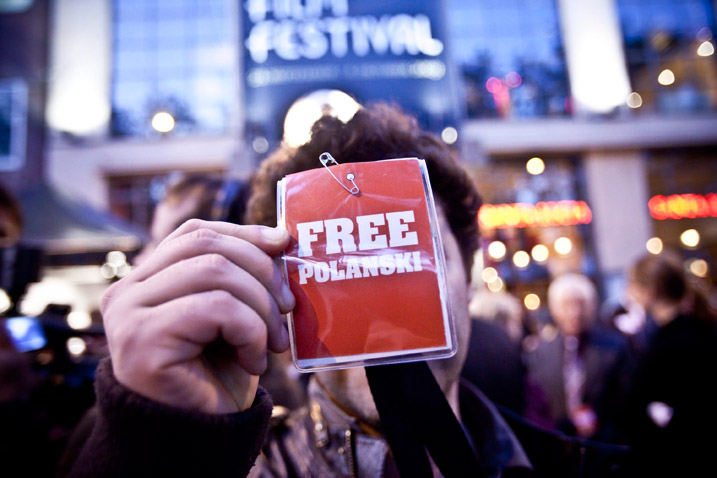 In “Roman Polanski: Wanted and Desired,” filmmaker Marina Zenovich attempted to shine a light on the darker corners of the Polanski rape case that forced him to flee the country. Its affect was considerable in the public perception of his case, to the point where it was soon reopened by investigators. Unfortunately, that led to a legal reconsideration as well, bringing heat to a longstanding desire from law enforcement officials to bring Polanski to justice. There’s no room for compassionate reconsideration in the world of law enforcement, but Zenovich’s follow-up, “Roman Polanski: Odd Man Out,” suggests that there’s possibly room for deception and corruption.
In “Roman Polanski: Wanted and Desired,” filmmaker Marina Zenovich attempted to shine a light on the darker corners of the Polanski rape case that forced him to flee the country. Its affect was considerable in the public perception of his case, to the point where it was soon reopened by investigators. Unfortunately, that led to a legal reconsideration as well, bringing heat to a longstanding desire from law enforcement officials to bring Polanski to justice. There’s no room for compassionate reconsideration in the world of law enforcement, but Zenovich’s follow-up, “Roman Polanski: Odd Man Out,” suggests that there’s possibly room for deception and corruption.
Zenovich’s documentary creates a narrative that almost feels like a thriller, turning 'Wanted and Desired' into something of a plot point, a pivot mark for the film’s story to germinate. With the case re-opened, additional scrutiny was placed on French citizen Polanski, who was just completing the critically acclaimed “The Ghost Writer” and was considering traveling to the Zurich Film Festival in Switzerland to accept a Lifetime Achievement Award. While the festival isn’t an event of considerable size worth risking Polanski’s relatively quiet private life, Polanski, who is part Swiss, considers it worth retreating from the editing room to accept the honor.
 Through a John le Carré-style correspondence with Swiss law enforcement, the American government opts to pressure local officials into obtaining Polanski and extraditing him to America, a cloak-and-dagger procedure that Zenovich suggests (not irrationally) is based in a show of political power. The festival organizers are shown under emotional distress as they realize not only will their guest of honor arrive, but that he’s become victim to the transgressions of the past.
Through a John le Carré-style correspondence with Swiss law enforcement, the American government opts to pressure local officials into obtaining Polanski and extraditing him to America, a cloak-and-dagger procedure that Zenovich suggests (not irrationally) is based in a show of political power. The festival organizers are shown under emotional distress as they realize not only will their guest of honor arrive, but that he’s become victim to the transgressions of the past.
Zenovich’s approach towards Polanski is notoriously generous, which automatically disrupts the sympathies of many who would watch either of her documentaries thus far. There’s a cold journalistic tactic to reduce the rape (of a minor, it’s worth noting frequently) to “something that happened.” Zenovich goes as far as showing the happy home life of victim Samantha Geimer, who has gone on record several times now having forgiven her attacker, a humanist gesture that could be either her own gentle spirit (she smiles freely with her equally forgiving husband) or the need to come to terms with a rocky event in the past.
This approach would appear humanist had it been balanced out with the acknowledgement that Polanski need not be defined as a “rapist” or “criminal” (or “filmmaker”) as much as he is a “person.” It is unfortunate that we continue to discuss the demons that corrupted Polanski on that day, as he surrendered to dark and ugly impulses that led to the contamination of an innocent life. To define the man by his actions, one must also weigh the considerable positive contributions to global cinema, to the culture at large. One does not cancel out the other, but together they illuminate a complex public persona. Unfortunately, Zenovich is not a type of cinephile, and as in 'Wanted and Desired,' remains uninterested in the value Polanski has to the world at large.
 Zenovich’s interests lie in the corruption and symbolic chest-puffing of those who would feel the need to enact vengeance on a healed wound. Some of this material sings, mostly in interviews with officials who struggle to justify the sudden “arbitrary” renewed interest in the Polanski case. A lot of it feels like angry conjecture, spiked with self-loathing. Zenovich seems ambivalent about the role her last doc had in Polanski’s imprisonment, to the point where her guilt overshadows the topic at hand (which occurs with great ease, given the considerable silence of certain parties involved in the doc).
Zenovich’s interests lie in the corruption and symbolic chest-puffing of those who would feel the need to enact vengeance on a healed wound. Some of this material sings, mostly in interviews with officials who struggle to justify the sudden “arbitrary” renewed interest in the Polanski case. A lot of it feels like angry conjecture, spiked with self-loathing. Zenovich seems ambivalent about the role her last doc had in Polanski’s imprisonment, to the point where her guilt overshadows the topic at hand (which occurs with great ease, given the considerable silence of certain parties involved in the doc).
It’s half due diligence, and half running on conceptual fumes — Zenovich seems convinced she’s caught a two-ton whale, not a sea of guppies, and the narrative swells with the sense of self-importance that comes from someone thrilled to unmask the muckrakers. It’s selective subjectivity overwhelming the pose of objectivity; when less time is spent on the healing period for those involved not only on that fateful day, but on the painful ensuing public trial than it is on the grief of the Zurich Film Festival organizers who cry crocodile tears that their main attraction is in cuffs, you have to wonder where everyone’s priorities lie. [C]

